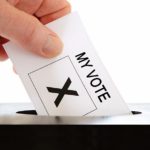
The 2010 midterm congressional elections promised to reshape the political landscape, and they did just that, as Republicans swept to victory in the House while cutting deeply into the Democratic majority in the Senate. But the vote also recast the terrain on moral and social issues important to believers of all political persuasions.
Background
Among the hot-button issues affected were abortion rights and gay rights. But economic issues galvanized religiously minded voters just as they did the entire American electorate, and debates over those matters were heated — questions such as whether or what spending should have been cut or raised, and whether or what taxes ought to have been cut or raised.
Arguments over who in society would bear the brunt of the cuts, or be the beneficiaries of the expenditures, divided liberal and conservative believers sharply.
This edition of ReligionLink provides an ongoing roll of stories and resources of interest to reporters covering religion and politics.
Developments
Polls, overviews and miscellany
-
The Pew Forum on Religion & Public Life: Politics & Elections
The Pew Forum on Religion & Public Life provides a resource page on religion and politics. It includes links to relevant surveys and news items.
- The Pew Forum on Religion and Public Life has an analysis of the shifts toward the GOP by religious group, based on exit polls from the National Election Pool.
- The Pew Forum also has a page tracking all Pew’s polls on voters according to religious identification.
- Eric Sapp, founding partner of the Eleison Group and a veteran of past Democratic religious outreach efforts, writes in The Huffington Post about the defection of faith-based voters to the Republicans and says the Democrats did not do enough outreach this time around.
- The Jewish Telegraphic Agency has a story on the fate of Jewish members of Congress. The JTA’s Capital J blog also has an overview.
- Oklahoma voters overwhelmingly approved (70 to 30 percent), an amendment that will bar the use of Islamic shariah law in state courts.
- The Belief Beat blog at Beliefnet.com has more links to various stories.
The religious right
As this ReligionLink edition on the Tea Party movement showed, there was much discussion as to whether Republican gains would signal a return to prominence for conservative Christians or whether economic issues would top the GOP’s agenda at the expense of social issues dear to the so-called religious right.
- In an essay at the liberal-leaning web site, ReligionDispatches, “The Tea Party Illusion,” Sarah Posner argues that the Tea Party and the Religious Right are much the same.
- In “There is No Tea Party Movement,” an essay at the website of First Things, a conservative-leaning periodical, editor Joe Carter largely agrees with Posner, though he thinks the return of Christian conservatives is a good thing.
- At CBN, correspondent David Brody dubs the new Republican wave the “Teavangelical Party,” indicating the overlap between the Religious Right and the Tea Party.
- R. Albert Mohler Jr., president of the Southern Baptist Theological Seminary, has an election analysis, “The Morning After — What Does It All Mean?” that parses the role of evangelicals in the vote and prospects for the religious right, among other observations.
- Former evangelical legacy Frank Schaeffer writes at the Huffington Post that one reason Republicans won is because of the apocalyptic views of their conservative Christian base.
- Read a Nov. 1, 2010, column in Christianity Today by Christian conservative leader Chuck Colson, titled “We Must Not Despair: It’s not the time to withdraw from politics.”
- A former speechwriter for President George W. Bush, Washington Post columnist Michael Gerson, made a similar point in this Oct. 29, 2010, interview in Christianity Today, though Gerson added several caveats to his exhortation.
Abortion
- The number of “pro-life Democrats” in the House was reduced by half thanks to the Republican gains but also to campaigning by anti-abortion activists who believed that Democrats who oppose abortion had undermined their credibility by backing President Barack Obama’s health care reform plan, which some abortion opponents claimed will fund abortion. Other pro-lifers disagreed. But the dispute diminished the political prospects for Democrats who oppose abortion in a year when the tides were already against them. Some say the loss of these Democrats hurt the anti-abortion movement by diminishing their leverage within the party.
- As in 2008, Colorado voters again handily defeated a “personhood” ballot question that sought to define a person as existing in legal terms “from the beginning of the biological development of that human being.” If it passed, such a law had the potential to outlaw any abortions and even use of some contraceptives and abortifacients. But many religious groups did not back the measure, believing it would lead to a setback in the courts that would hurt opposition to abortion more than helping it. Still, the personhood movement remained a viable force in other states. On Oct. 25, 2010, Christianity Today published a number of responses in a roundtable titled, “When Life Begins: Do laws defining personhood help the unborn?”
Gay rights
Momentum was building to repeal the military’s “don’t ask, don’t tell” policy barring homosexuals from serving openly in the armed forces. Odds for advancing other issues on the gay rights agenda appeared to have diminished as well. At the same time, Obama had appointed more openly gay administration officials than any other president, and Americans were (and continue to be) increasingly open to gay rights, including same-sex marriage.
Immigration
Many faith groups and religious leaders from across the spectrum pushed for comprehensive immigration reform. The Republican resurgence diminished those prospects even though many conservative Christians with ties to the Republican Party supported immigration reform. A number of candidates played on voters’ fears of illegal immigrants in campaign ads and speeches.
